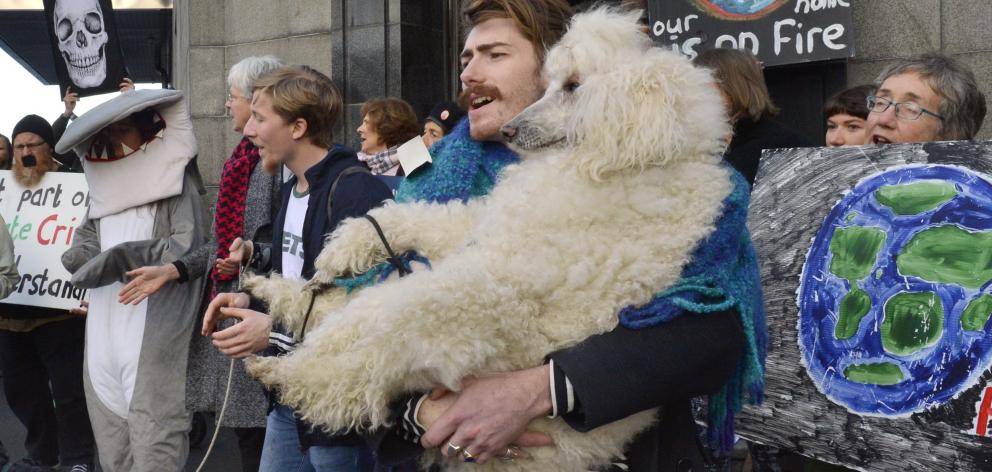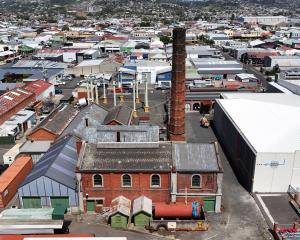
It is not every day you get the chance to fight a multinational oil giant in your own back yard.
That is the prospect facing Jack Brazil, a spokesman for Oil Free Otago, as he and the other members of the group plot protest action against OMV when it enters southern waters later this summer.
"It’s not every day you can stand up to these companies that are responsible for so much harm in the world.
"Personally, that’s why I stand up to them — it’s the intersection of climate justice and, as well as the emissions, this also has an impact on people and the environment as well as the future climate," he told the Otago Daily Times this week.
His comments came after the Environmental Protection Agency this week granted OMV consent to drill up to 10 exploration and appraisal wells in the Great South Basin — which lies off the Otago and Southland coastline — by 2030.
The decision has been welcomed in some sectors but slammed by environmentalists, including Mr Brazil, who said it was ‘‘a slap in the face’’ at a time when New Zealand was moving away from oil and gas exploitation.
And, as well as the environmental implications of more drilling, Mr Brazil said the company’s links to other atrocities raised concerns.
A recent Carbon Majors Report, published in 2017, named OMV AG — the Austria-based parent company of OMV’s global operations, including OMV NZ — as one of the top 100 companies responsible for 71% of global emissions.
OMV came in at 94 on the list, which also featured big players ranging from China’s nationalised coal output to the likes of ExxonMobil, Shell, BP and Chevron.
At the time, the Guardian highlighted the report’s blunt warning — that if fossil fuels continued to be extracted at the same rate over the next 28 years as they were between 1988 and 2017, global average temperatures would be on course to rise by 4degC by the end of the century.
That was likely to have catastrophic consequences, including substantial species extinction and global food scarcity risks, it warned.
However, Mr Brazil said OMV’s alleged links to war crimes in Sudan — which the company denies — also raised concerns.
In 2010, a group of charities and peace activists published a report — Unpaid Debt — which accused three oil companies, including OMV, of being complicit in war crimes and crimes against humanity in Sudan.
The three companies — led by Swedish oil company Lundin and also including Petronas of Malaysia — operated as a consortium to extract oil from an area known as Block 5A in Sudan, beginning in 1997, the Guardian reported.
The area was not then controlled by the Sudanese government, and the oil companies’ interest triggered a "vicious" war in the area between 1997 and 2003.
Accusations included indiscriminate attacks on civilians, rape, torture and the abduction of children.
The Lundin consortium was accused of working alongside the perpetrators, and having an infrastructure that enabled crimes committed by armed forces, the Guardian reported.
Lundin has continued to deny it violated international law or that it participated in, or had knowledge of, any of the illegal acts documented in the report, the Guardian reported.
The report — which called for an investigation — triggered a nine-year probe, which concluded in October last year when the Swedish Prosecution Authority announced it would indict Lundin’s chief executive and chairman.
The trial is expected to begin next year and take two years, but the pair — who face life sentences if convicted — continued to deny the allegations, media reports at the time said.
But OMV’s record has already attracted protests in New Zealand and by Kiwis abroad this year.
In October, climate activist Mike Smith, of Nga Puhi and Ngati Kahu, travelled to Vienna to accuse OMV chief executive Rainer Seele in the International Criminal Court of crimes against humanity and the environment, including genocide.
Mr Smith claimed OMV had contributed to the destruction of the land and livelihoods of indigenous peoples, including Maori.
"By continuing the search for new oil and gas to burn in the face of the climate emergency, companies like OMV are condemning our grandchildren to a future of immense suffering," Mr Smith said.
"We believe that this is a crime of global proportions and as such, the company executives that are making these decisions deserve to stand trial."
And last month, protesters
boarded an OMV support ship, Skandi Atlantic, while it was docked in Timaru, to highlight the company’s links to global emissions and allegations of war crimes and crimes against humanity in Sudan.
Mr Brazil said the company could expect more of the same when it turned its attention to the Great South Basin.
"It’s just going to be complete opposition every step in the way.
"Direct action is one of the only ways you can get such a large corporate, like OMV, to listen."
OMV staff in New Zealand and Austria did not respond to ODT questions yesterday, including on Oil Free Otago’s concerns or when the company would begin drilling here.
However, OMV’s ambitions in southern waters have been welcomed by others, including — cautiously — the Otago Chamber of Commerce, which has said tight environmental monitoring would be needed but economic benefits could follow for Dunedin.
The Petroleum Exploration and Production Association of New Zealand (PEPANZ) has also welcomed the EPA’s decision to grant drilling consents for the Great South Basin as "great news".
PEPANZ chief executive John Carnegie said it "makes sense" to develop energy sources within New Zealand, rather than import it, and a discovery of natural gas or oil would have "major economic benefits".
Taxes and royalties for the Crown would be "substantial" and investment in infrastructure and well-paid jobs "will help secure a more inclusive and prosperous society".
"All credible forecasts show the world will still need new reserves of natural gas and oil as we transition to a lower-emissions world.
"Natural gas in particular is a crucial transition fuel, providing affordable and reliable lower-carbon energy for New Zealand."
Comments
Get that drill in the floor and get pumping. It's either that, or you all pay for higher priced importing. This will create jobs, valuable jobs that will create productivity for Dunedin and the wider region. If you really are serious about protesting, start with yourselves, stop using anything to do with gas and oil. As a consumer, reduce demand. And before you all tear away and by electric cars, look at what they are made of and where the components come from. Until we find some other source of energy, we are better served to conserve what we have and continue looking for what we need while educating on conserving the resource. Lets start by putting limits on vehicles with high fuel consumption. Protest the big utes and V8's at the lights. Protest the cruise ships burning 200 tons of fuel daily. Protest yourselves going for Sunday drives. The consumption is the problem here.
"It’s just going to be complete opposition every step in the way."
I'm sure there will be opposition but I'm equally sure it won't be complete.
If Jack Brazil was actually concerned about the living standards of current and future generations I would expect some positive activity in providing new energy sources that are viable for consumers.
A wrecking ball doesn't care what it smashes. Some one lines it up on target, provides the energy, then lets it go, to do it's mindless task.
Smashing other people's lives, societies, countries, in the name of a moral cause has plagued humanity throughout time. I see no difference here.
Claiming that oil and gas companies are responsible for our desire for a prosperous life is ridiculous, as is suggesting living standards should be reduced.
Even the child protestors are stating their displeasure at that thought.
This only leaves one course of action that advances humanity. That is to follow the same course we have been on for decades which is improved efficiency, innovation, development and adaptation of all our technologies.
Reducing our energy costs enables us to invest in advanced technologies which is what we need.
If Jack was so concerned about the environment, dont have a pet.
-"Personally, that’s why I stand up to them — it’s the intersection of climate justice and, as well as the emissions, this also has an impact on people and the environment as well as the future climate,"-
At this time Google,Dell,Tesla,Microsoft and Apple currently face a US lawsuit for their part in the deaths and abuse of children mining cobalt in Congo for electric car, laptop and cell phone batteries. While Bolivia, one of the worlds most impovished countries, and having the worlds largest Lithium reserves, faces environmental ruin and water pollution for the mining of Lithium for batteries.
Which of the evils do we choose Jack? Vehicle tyres use between 15 and 40 litres of petrolium based product, what shall we do for tyres Jack? Or do you think we'd be better without modern communications, sitting in the dark and walking everywhere until we come up with something better? A steady and well researched transition to new ways is the only way, or we'll face chaos anyway.












